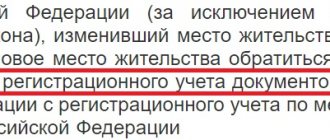Here I will show you how to discharge people who do not live in the premises from a non-privatized apartment. The extension of privatization encouraged those who did not use the right to receive an apartment for free.
Privatization involves the participation of all persons registered in the apartment.
Those actually living in the apartment, but not registered, do not participate in privatization.
Those who want to privatize their apartment are faced with, at first glance, an insoluble problem.
It is impossible to privatize an apartment without the consent of all registered people, even those not actually living in the apartment.
How to discharge non-residents from a non-privatized apartment?
The answer to this question is simple.
If you do not take into account voluntary deregistration from the apartment, when the person registered independently checks out of it, then there is only one way left - judicial.
In order to discharge an absent tenant from a non-privatized apartment, it is necessary to apply to the court with a claim to recognize the defendant as having lost the right to use the residential premises.
In a court case, the defendant will be the absent tenant registered in the apartment.
If you bring such a claim to court and win the case, then after receiving a court decision by which the defendant is recognized as having lost the right to use the residential premises, you can discharge him from the non-privatized apartment without the defendant’s consent.
To be discharged, it will be enough to bring the court decision that has entered into legal force to the passport office, and this citizen will be discharged from the apartment without his consent.
It would seem that everything is simple. But as in any business, a lot of questions arise:
- How to prepare a statement of claim?
- Which court should I file my claim in?
- What evidence should I provide to the court?
- How to win a court case in order to force a discharge?
The questions are, of course, important and pressing.
But no matter how strange it may seem, these questions are premature, since, first of all, it is necessary to assess the prospects of the court case and the chances of success.
First, check whether you have a chance of winning the court case, and only then get involved in a legal battle.
How to discharge voluntarily?
In order to deregister from a municipal apartment, you must contact the official authority whose competence includes the provision of deregistration services. The interested party will need to prepare a number of documents.
Where to contact?
The authority that provides services for deregistration is the territorial body of the Ministry of Internal Affairs. You can contact it in several ways:
- Personal visit. You will need to prepare documents. The application form will be provided to him by the service specialist.
- MFC. The center will act as an intermediary who will send all information to its destination.
- State Services Portal. This option allows you to submit your application remotely. Read more about how to check out of an apartment through the State Services portal here.
Regardless of the method of sending the application, you will still have to come to the department of internal affairs or the MFC in person in order to have the discharge stamp affixed to your passport.
Documentation
The basis for deregistration is the application of the interested person. It is drawn up according to Form 6, approved by Order of the Ministry of Internal Affairs of Russia dated December 31, 2021 No. 984.
The following documents are attached to the application:
- passport of the interested person;
- departure slip;
- residential rental agreement.
Important! The said application is submitted simultaneously with the application for registration at the new address.
Timing and cost
The period for deregistration from a municipal apartment depends on the method of application.
- Through the Department of Internal Affairs - three calendar days.
- Through the MFC plus a couple of days for delivery of documents.
- Public services require discharge on the day the application is received.
According to paragraph 62 of Order of the Ministry of Internal Affairs of Russia dated December 31, 2021 No. 984, payment for the provision of services of this nature is not charged. That is, upon discharge the person does not pay any money. Costs can only be incurred when using the services of a legal representative, for example, when notarizing a power of attorney.
How to check the chances of successful checkout from an apartment?
If the registered person does not want to voluntarily leave the apartment, then he can be discharged only on the basis of a court decision.
This court decision must indicate that the registered person is recognized as having lost the right to use the apartment.
Starting a legal dispute without assessing the positive prospects for the outcome of the case is very frivolous. It is advisable to first assess the chances of success.
Let's compare your personal situation with the conditions under which a registered person can be recognized as having lost the right to use residential premises in court and on this basis be discharged from the apartment.
If these conditions coincide with your life situation, then we can assume that you have a certain chance of achieving the desired result.
Note that I'm talking about chances, not guarantees.
There can be no guarantees in court cases, because our court is not only “the most humane court in the world,” but also the most “unpredictable.”
If some lawyer or attorney gives you a 100% guarantee that he can get you out of your apartment, then you can safely spit in his face (figuratively), because these are false guarantees.
We will call the person whom you need to recognize as having lost the right to use residential premises and then discharge from the apartment – “defendant”.
So let's get started.
General legal situation for extracting from a non-privatized apartment.
The general legal picture of your situation should look like this.
First. The apartment you want to check out of must be non-privatized.
What does this mean?
This means that the apartment should not be owned by citizens, should not be a service apartment and should not have the status of a hostel.
Simply put, the apartment must be provided under a warrant or under a social tenancy agreement.
You can also be discharged from an apartment that is owned by a citizen, as well as from a service apartment or a hostel.
Here we will consider the conditions that apply only to deregistration from a non-privatized apartment.
Second. The defendant does not live in the apartment.
The defendant must live in any other place (no matter where), just not in the apartment from which you are going to discharge him.
The maximum period for the defendant not to reside in the apartment, after which he can be discharged, is not defined by law.
Previously, back in Soviet times, there was a rule according to which a 6-month absence (non-residence) in an apartment entailed the loss of the right to use this apartment and, as a consequence, the loss of registration. Now this rule does not apply.
Regarding the period of non-residence, you need to understand the following: the longer the period of non-residence in the apartment, the greater the chances of being discharged from the apartment.
Extract by court decision
The trial can take a very long time. If the person being discharged is not aware that he is being discharged through a court decision, then the process will last no more than 2 months. If he suddenly decides to challenge the court’s decision, the case could drag on for up to six months. Thus, the issue of discharging a person through the court can take a lot of effort and money.
When the court makes an appropriate decision, the issue of discharge is resolved quite quickly in the future.
The procedure for eviction by court order is as follows:
- an application must be submitted to the migration service;
- the application must be accompanied by a corresponding court order and a rental agreement;
- the migration service makes a decision within 3-7 days and discharges the relevant person;
- if the person’s discharge is impossible, then the refusal will follow immediately, at the time of submitting the application;
- If an extract is refused, you can contact the bailiff service to enforce the decree on the extract forcibly.
If there is a judge's decision, you can discharge a person who is registered in a municipal apartment without any problems. However, if such a person does not participate in the consideration of the application in court, then he can appeal such a decision within a year from the date of the decision.
In addition, if the deregistration of a person is carried out on dubious grounds, even if such grounds were certified by a court decision, then, upon the application of the authorized state body, this decision can be appealed and cancelled. So it is necessary to act within the framework of the law.
Constant absence from the apartment.
The first and main condition under which the defendant can be recognized as having lost the right to use the apartment and on this basis be discharged from it is a permanent absence from the apartment.
Absence (non-residence) in an apartment can be permanent or temporary.
In other words, the defendant may be absent from the premises temporarily or absent permanently.
If the defendant has left the apartment for a while, that is, his absence from the apartment is temporary, then it will not be possible to recognize such a defendant as having lost the right to use the residential premises on legal grounds.
If the defendant is temporarily absent from the apartment, it is inappropriate to go to court with a claim to recognize him as having lost the right to use the residential premises, since there are no grounds for winning in court.
If the defendant is constantly absent from the apartment, then you have legal grounds to expect victory in court.
The reasons for the defendant’s constant absence from the apartment may be:
- leaving the apartment for another place of residence,
- initial failure to move into the apartment (that is, the defendant never moved into the apartment or lived in it).
How to distinguish a temporary move out of an apartment from a permanent move out?
The following reasons for leaving the apartment may indicate a temporary absence from the apartment.
For example:
- traveling to work in another area (long business trip, rotational work, etc.);
- training (full-time at a foreign university, studying abroad, etc.);
- treatment (hospitalization in a hospital, medical examination, etc.).
The above reasons are not the only ones. There may be other reasons and life circumstances under which the defendant may be temporarily absent from the residential premises.
If the reasons for the defendant’s departure from the apartment are the above circumstances or other facts similar to them, then the absence from the residential premises is temporary.
It will not be possible to recognize such a defendant as having lost the right to use residential premises on legal grounds.
The following circumstances may indicate the permanent absence of the defendant from the apartment:
- the defendant removed his belongings;
- moved to another locality;
- got married and lives with a new family in another residential area;
- the defendant never moved into the apartment and the failure to move in was not related to work, study or treatment.
The listed circumstances indicating a permanent absence from the apartment are not the only possible ones; there may be others.
Other circumstances, which can be very diverse, may also indicate the permanent nature of absence from the apartment.
It is important that the reasons for such absence are not: work, training, treatment, or circumstances indicating that the defendant’s absence from the apartment is temporary.
Thus , if the defendant is absent from the residential premises and this absence is not related to work, study, treatment or other similar circumstances, but he has taken out his things and/or moved to another locality and/or got married, or never moved into the apartment, then such absence can be considered permanent.
And as a result, you have a chance of success in a court case to recognize this citizen as having lost the right to use the apartment.
However, not all so simple.
There are a number of additional circumstances that the court must examine, and on which the outcome of the court case also depends.
Arbitrage practice
Forced discharge or discharge without consent can only be carried out by a court decision. Such cases are heard in district courts, not regional ones. When the defendant's address is not known, the application is submitted to the department at the place of residence. The court does not write out, but only deprives the right of residence. After this, you need to contact the passport office and carry out the entire procedure yourself. Therefore, make mistakes and indicate in the application that you want to deprive the right of residence, and not write it out. Otherwise, no one will consider your case.
Voluntary departure from residential premises
The second condition is the voluntary departure of the defendant from the apartment or the voluntariness of his non-movement.
The court must clarify the question of whether the defendant voluntarily left or did not move into the disputed apartment, or whether his departure (non-movement) was forced.
The forced nature of leaving the apartment or not moving into it may be due to conflictual relationships with other persons living in the apartment or the dissolution of a marriage with a person living in the apartment.
If the defendant left the apartment or did not move into it voluntarily, and not forced, then this circumstance will bring you closer to achieving the goal of removing the defendant from the apartment.
If leaving the apartment or not moving into it was forced, and it was associated with conflicting relationships in the family (and the nature and degree of conflict in the relationships between those living in the apartment does not matter) or with the dissolution of a marriage, then it will not be possible to discharge the defendant from the apartment.
Who can't be evicted?
Persons who cannot be evicted from a municipal apartment include:
- minors;
- orphans and children without parental care;
- dependents;
- declared incompetent;
- former family members without their own living space;
- the spouse who set the condition in the marriage contract;
- persons specified in the will;
- those who refused privatization;
- missing.
These categories can be written out only if they have their consent, as well as permission from authorized official bodies, for example, in relation to children and the incompetent, the consent of the guardianship authorities is required.
There is information on our website about the nuances and procedure for deregistration, for example, from a private home, as well as how to deregister if you live in another city.
Extract from a municipal apartment is possible both voluntarily and compulsorily. In the first case, you need to write an application and attach a small package of documents to it. In the case of a claim and discharge of children, a much larger amount of information will be required.
Obstacles to the use of residential premises
The third condition is the absence of obstacles in using the apartment.
The court will also clarify the question of whether other persons interfered with the defendant’s use of the apartment.
Obstacles can be very diverse, but the main ones include restricting access to the apartment (by changing locks, physical obstruction, creating an unbearable psychological atmosphere, etc.).
In other words, the court must find out whether obstacles were created for the defendant in using the apartment.
If the defendant was prevented from using the apartment, then it will not be possible to recognize him as having lost the right to use the residential premises, since the court will most likely side with him.
However, if no obstacles were placed in his use of the apartment, and he could live in it without hindrance, then, if the other necessary conditions are met, this defendant can be recognized as having lost the right to use the residential premises and discharged.
Ex-husband's statement
Doing this without consent is quite problematic, but there are still several nuances that need to be taken into account. Former spouses are also subject to the law, which can evict them if they violate public order, if they have debts on utility bills and if the premises are used for other purposes. You can even carry out the procedure without his knowledge if he is in prison or similar correctional institutions. But upon his return, he can demand reinstatement of his rights. And in cases of selling an apartment, challenge the transaction in court.
What to do with a municipal apartment? In this case, the only thing that can help you is the fact that the citizen no longer lives on the premises, i.e. absent for a long time. To do this, it is worth collecting testimony from neighbors, inviting a local police officer who will record this fact in the protocol, and going to court. This can be done even two years after the divorce, because then the ex-husband will be recognized as having lost his right of residence.
A completely different case is when housing was purchased and privatized during marriage. Here the court is unlikely to make a positive decision on deprivation of the right to reside in such real estate.
As for civil marriage, you should not immediately register your husband or wife. It is better to do this over time, and first issue temporary registration for a year, so that, if necessary, there will be no problems with eviction of such a person. In any case, such processes very rarely take place without the help of a lawyer.
Acquiring the right to use another residential premises
The fourth condition is the acquisition by the defendant of the right to use another residential premises in a new place of residence.
The court will also be responsible for clarifying the question of whether the defendant has acquired the right to use another residential premises.
In this case, it does not matter on what right the defendant acquired the right to use another residential premises: on the right of ownership, under a lease agreement, a sublease agreement or on another right.
If the defendant has acquired the right to use other premises, then this circumstance will be taken into account in favor of making a decision to recognize him as having lost the right to use the disputed apartment.
However, if the defendant, who voluntarily left the disputed apartment for another place of residence, does not have the right to use another residential premises, in other words, he does not have his own other housing (for example, he rents an apartment), then this circumstance in itself cannot be a basis for refusal in recognizing the defendant as having lost the right to use the disputed residential premises.
In other words, if the defendant who is registered in your apartment does not own another apartment, house or share in common property, this does not mean that he cannot be discharged.
Thus, if the defendant has moved out of your apartment, but he has no other housing, this does not mean that he will win the case.
The defendant’s lack of other housing does not guarantee him the right to be registered in your apartment.
What laws govern deregistration from council housing?
Legislative acts that regulate the deregistration procedure include:
- Civil Code of the Russian Federation. For example, Article 20 determines a person's place of residence.
- Housing Code of the Russian Federation. Chapter 8 of this normative act defines the entire procedure for social rental of residential premises.
- Law of the Russian Federation of June 25, 1993 No. 5242-1 “On the right of citizens of the Russian Federation to freedom of movement, choice of place of stay and residence within the Russian Federation.” It allows you to change and choose your place of residence independently of anyone.
- Family Code of the Russian Federation. He protects the rights of families and children. Issues regarding the child's discharge are indirectly reflected in this act. For example, Article 65 states that in case of separation, the place is determined by the parents.
Fulfillment of obligations to pay for housing and utilities
The fifth condition is fulfillment of the obligation to pay for housing and utilities.
The court will also clarify the question of whether the defendant fulfills his obligations to pay for housing and utilities, etc.
If, after leaving (or not moving in), the defendant did not pay for the residential premises and utilities, then this circumstance increases the chances of winning in court and recognizing him as having lost the right to use the residential premises.
If the defendant, while not living in the apartment, continued to pay in full or part of the expenses, then recognizing him as having lost the right to use the apartment will of course be problematic, but still possible.
My optimism in this matter is based on one of the rulings of the Supreme Court of the Russian Federation, which, in a similar case, found the defendant to have lost the right to use the apartment, despite the fact that he made partial payments for living quarters and utilities.
Thus, if you pay for housing and utility costs, and the defendant does not bear any expenses along with you, then this fact will become another stone in the foundation of your victory in court.
What documents will be needed?
The package of documents required upon discharge depends on which authority is being submitted to and by whom exactly. If the resident is discharged voluntarily, he must provide:
- identification document;
- departure slip;
- real estate documents, for example, a social tenancy agreement.
When discharging a child, guardianship authorities require:
- parents' passports;
- birth certificate (or child’s passport);
- registration certificate for the apartment from which the minor is being discharged;
- registration certificate for the property in which it is going to be registered;
- certificates of residents who are registered in both residential areas;
- personal accounts of apartments;
- applications from both parents for discharge;
- application of the child if he has reached 14 years of age.
The guardianship authorities make a decision within two weeks. After this, you must take the following to the passport office:
- permission;
- passport;
- documents of the minor;
- social rent agreement or warrant for an apartment;
- certificate of departure of a minor.
These documents will be needed if a person is discharging himself or is planning to discharge his child. It’s another matter when the initiator is the municipality. The authorized person is obliged to submit:
- statement of claim;
- utility bills (if the defendant has arrears);
- an extract from the house register;
- documentary evidence that the defendant violated the rules of residence;
- witness's testimonies.
The court, after considering all the evidence in the case, will decide to evict the tenant. Within the specified period, documents for discharge are submitted to the passport office.
A court decision is binding unless appealed according to the established procedure.
Who has the right to file a claim in court to be evicted from the apartment?
The following persons have the right to file a claim in court to recognize the defendant as having lost the right to use residential premises:
- landlord,
- employer,
- family members of the employer.
The landlord is the owner of a non-privatized apartment. Most often these are local government bodies (city, district administrations).
We will not consider the landlord as a plaintiff, since in the vast majority of cases these authorities do not have time to deal with such minor issues.
An employer is a person:
- in whose name a warrant was issued to move into the disputed apartment (as a rule, warrants were issued before March 1, 2005),
- or with whom a social rental agreement for an apartment has been concluded (as a rule, social rental agreements began to be concluded after March 1, 2005).
Family members of the employer are:
- the employer's spouse,
- employer's children
- the employer's parent.
Other relatives and disabled dependents are recognized as family members of the tenant of the residential premises under a social tenancy agreement if they are settled by the tenant as members of his family and run a common household with him.
In exceptional cases, other persons may be recognized as family members of the tenant of a residential premises under a social tenancy agreement in court.
So, if you are a tenant (that is, a warrant was issued in your name, or a social rental agreement for an apartment was concluded with you), then you can accordingly file a claim in court to recognize the defendant as having lost the right to use the residential premises.
If you are a member of the tenant’s family (even if the tenant is no longer alive or has moved out of the apartment), you are registered and live in the disputed apartment, then you also have the right to file a claim in court to recognize the defendant as having lost the right to use the residential premises.
In this case, the defendant may be the tenant himself, if he does not live in the disputed apartment and his non-residence complies with the conditions described above.
So, summarizing the above, we can state the following:
If your situation meets the described conditions, then you have legal grounds to expect victory in court.
All that remains is to decide how you will achieve your goal.
Let's remember the key points:
- the apartment must be non-privatized, that is, it does not belong to the right of ownership of a citizen (at the same time, this apartment is not a service apartment and does not belong to dormitories);
- the defendant is absent from the apartment permanently and not temporarily;
- the defendant left or did not move into the apartment voluntarily, and not forced;
- the defendant was not interfered with in using the apartment;
- the defendant acquired the right to use another residential premises (optional condition);
- the defendant did not fulfill his obligations to pay for housing and utilities properly.
If all the key points are similar to your life situation, then go to court, seek recognition of the defendant as having lost the right to use the residential premises and discharge him from the apartment.
What else does checking the chances of success in a court case provide?
1. the check will save you from dangerous illusions and misconceptions regarding the possibility of discharging a person from a non-privatized apartment;
2. Having independently assessed your chances of winning the case in court, you will be able to be critical of the demagogy of individual lawyers and jurists who are ready to make any promises as long as they pay for the services;
3. Having independently assessed the prospect of the outcome of the court case, you will know exactly what facts and circumstances you will have to prove in court.
What is the algorithm of action in this case?
Algorithm of actions when evicting a person:
- Drawing up a statement of claim with the reasons for eviction of the tenant from the premises, which is then submitted to the court at the location of the apartment. To do this, they often turn to professionals and notaries;
- The following documents are attached to the statement of claim: a certificate of ownership, a receipt with debts for utility bills or a certificate of divorce;
- If the ex-spouse does not appear in court, the process will drag on, and then for a long time you will not be able to obtain a legal basis for depriving the person living in your property of registration;
- Next comes the trial and a decision is made in your favor. If a person has no other place to live, his discharge may be delayed for some time.
You should take into account that joint privatization will not make it possible to evict your ex-spouse and his family from the house.
In addition, even donated housing, which has undergone extensions with your participation, is considered jointly acquired property. When a citizen who is in prison is deprived of the opportunity to live, one must be prepared for the fact that after release the person may demand through the court that the transaction be declared illegal and, most likely, will win the case and return to his home.











